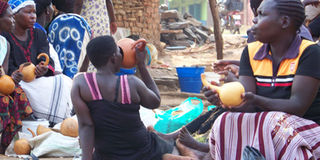Report values illicit alcohol in Uganda at Shs2 trillion

Women take Kwete, a local brew. The licensed brewers want attention to be put on illicit brewers so that they can be taxed. FILE Photo
What you need to know:
Not available. No proper audit is available for the sector to be taxed.
Kampala. It is a common sight to find a group of men and women seated around a pot and drinking ‘some local’.
The largest form of alcohol brewing and consumption is not regulated. That market has been valued at $676m (Shs2.4 trillion), by the Euromonitor, a global market intelligence research company.
Hired by Nile Breweries to conduct the research, Euromonitor in its findings in the “Alcoholic Beverages Market Size Uganda 2015”, noted that as a result of the illicit alcohol sales, the government was losing potential tax revenues of about Shs616b annually.
The report was released last week at the Kampala Serena Hotel.
“Until now, a lack of consistent or proper enforcement, inspection, and registration of traders and transactions has allowed illicit production to flourish,” the summary of the findings reads.
“The authorities are now starting to address this. For example, the Taxpayer Registration Expansion Project has contributed to widening the taxpayer base,” the report adds.
Quantities
The report highlights that the Ugandan market consumes about 110.6 million litres of alcohol, of that, 67.7 million are from illicit alcohol and 43 million litres from the licensed brewers.
According to the report, there are three categories of illicit alcohol in Uganda.
There is alcohol that is smuggled in the country – mostly spirits -, counterfeits and illicit homebrew. The homebrew is the most common type of illicit alcohol as it contributes 53.3 per cent to the volumes, 42.4 per cent to the value and 36.7 per cent to the fiscal loss.
Home brewing is common across the country because it in part is a tradition and also generates income – that remains untaxed.
“There is a clear correlation between affordability and high rates of unrecovered alcohol. Widespread poverty, lack of gainful employment and a long cultural tradition of domestic production of alcohol has contributed towards illicit production becoming the mainstay of household income in both rural and urban settings,” the report reads.
The alcohol making companies are in particular concerned about the trade in illicit wines and spirits, which the report classifies as a profitable venture that is not facing tax measures like the large formal established businesses are doing.
Mr Onapito Ekomoloit, the corporate affairs director at Nile Breweries, said that there was a need for the tax authorities to focus their attention on small and medium sized distillers that were not paying their fair share of taxes.
The challenge for the tax body is having the resources to enforce an illicit market that is unreachable, according to the report and there are no proper audits to indicate sales.
“The illicit sale of alcohol is something we have been fighting as Uganda Revenue Authority (URA) for a while now and we have not registered success. It is consumed in places where taxes are hard to collect,” said Mr Siraje Kanyesigye, the commissioner enforcement at URA said at the launch of the report.
The working assumption is that the Tax Payer Expansion Project (TREP) by URA, Kampala Capital City Authority and municipal councils would be able to get details of traders.
Traders will be forced to file tax returns and indirectly, a tax will be charged on some of that illicit alcohol.




